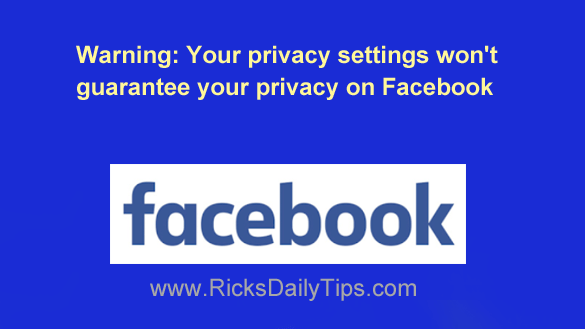 “Privacy Warnings” of one type or another have been making the rounds on Facebook ever since the site first came into existence.
“Privacy Warnings” of one type or another have been making the rounds on Facebook ever since the site first came into existence.
While most of those warnings range from completely worthless to downright malicious, a few of them actually have some merit.
Privacy is indeed a serious concern on Facebook, but many folks understandably attempt to attack the problem from the wrong angle.
While you can and should lock down the privacy settings on your Facebook account as much as you possibly can without cutting your friends and followers completely out of your online life, the most effective privacy measures take place before you even touch the mouse, keyboard or touch screen.
Truth be told, the key to true privacy on Facebook is being judicious about what you post in the first place.
Even if you limit access to your posts and images to “Friends” and have just one Facebook friend who you trust completely, your “private” information could still potentially find its way out into the wild, wild west of the Internet.
Sure, you might trust that one friend with your life (and justifiably so), but he/she is human, and all humans make mistakes.
Consider the following scenario…
Without any mal intent whatsoever, your friend might email that “private” picture of your toddler splashing around naked in the bathtub to one of their most trusted friends (we all have them, right?) who in turn emails it to another trusted friend.
The problem is somewhere in that chain of “trusted friends” there might be a friend who doesn’t really deserve the trust that’s been placed in them.
That friend just might take that photo of your naked toddler and share it with some folks (or websites) that will use that image in ways that you never imagined. And once an image is on the Internet, it never, ever goes away.
I’m not saying this to try to diminish the trust you have in your most trusted friends. I’m saying it because trust can only apply in regards to intent.
Your friend might have the best intentions in the world, yet take actions that can be quite damaging to you and your family without meaning to cause any harm.
And here’s another scenario to consider…
Your trusted friend becomes bored at a party and decides to find a nice, quiet corner where she pulls out an iPad and fires up Facebook just to pass the time .
Nature calls while that sensitive photo is displayed on the screen so she lays the iPad down and heads to the nearest bathroom. When she returns there are half a dozen people she barely knows looking at the photo and taking snapshots of it with their phones.
I could go on but I’m sure you understand where this is going. This scenario might seem a bit far-fetched, but similar scenarios happen all the time.
And now, one last scenario that literally plays out numerous times every day around the world…
You receive a legitimate looking email or text message explaining that your Facebook account has been hacked and you need to change your password.
You click a link in that message that takes you to a legitimate looking, but fake Facebook page with a form where you can ostensibly change the password on your account.
On that form are fields for you to enter your Facebook username (or email address), your current password and a new password.
If you fill out that form you’ll end up giving the hacker both your Facebook username and current password. That means he’ll be able to log into your account and do anything that you can do with it – including steal all of your photos and read all of your private messages!
Hopefully by now you know better than to fall for phishing attempts like the one described above, but sadly thousands of people fall for them each and every day.
All of the above brings me to this…
True, non-breachable privacy on Facebook is not determined by your account’s privacy settings, and certainly not by the privacy settings of your friends.
If something can be viewed on a computer screen or on a mobile device, it can be copied, photographed with a camera or smartphone, and then shared in a multitude of ways.
In a nutshell, there’s no setting in Facebook that can prevent all of those possibilities.
If you post something on Facebook (or anywhere else on the web for that matter), there’s a very real possibility of it making its way onto the Internet at large. And there is absolutely nothing you can do to prevent it from happening.
Once you click, “Post”, “Publish” or “Send”, that information or photograph is no longer under your control.
That’s why it’s important to remember that the only things that are truly private on Facebook (and the Internet in general) are the things that never get posted in the first place.
Bonus tip: Facebook isn’t the only place online where safety, security and privacy is important. Most everything you do online comes with its own set of security risks.
A fantastic book titled “Step-by-Step Cyber Security for Beginners” will give you the info and tools you need to remain safe online. Click here to check it out.